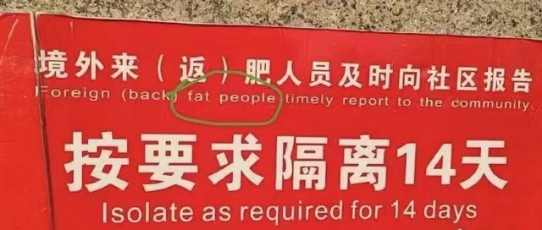Fat people timely report
« previous post | next post »
Zeyao Wu sent me this photograph that she found online:
This is what the sign really says:
Jìngwài lái (fǎn) [Hé]féi rényuán jíshí xiàng shèqū bàogào-àn yāoqiú gélí 14 tiān
境外來(返)【合】肥人員及時向社區報告-按要求隔離14天
Persons returning to [He]fei from abroad should timely report to the community (authorities) and isolate as required for 14 days.
The mistake occurred because the place name was abbreviated from Héféi 合肥 to féi 肥, which, by itself, does mean "fat".
Zihan Guo told me that her initial reaction / topolectal reflex (before she ascertained the context) was to read fǎnféi 返肥 ("return to fei") as accented fǎnhuí 返回 ("return"). In the Gan 贛 topolects her family speak, huí 回 ("return") is pronounced exactly as féi 肥 ("fat"). Cf. this comment on the lack of a distinction between f- and h- in Taiwan Guoyu / Mandarin.
Selected readings
- "Ask Language Log: The alphabet in China" (11/6/20)
- "'Forty Days and Forty Nights'" (2/29/20)

Scott P. said,
December 20, 2021 @ 2:13 am
So the third character from the end in the top line looks odd to me, and the transcription uses a different character. Could someone explain?
Thomas Rees said,
December 20, 2021 @ 3:28 am
区 is the simplified version of 區. Even I know that.
Victor Mair said,
December 20, 2021 @ 6:18 am
@Scott P., @ Thomas Rees
Sharp eyes!
Zeyao Wu, the person who sent the photograph and the transcription to me, is a mainlander now studying in Hong Kong. It looks as though she has gotten into the habit of using traditional characters.
For ease of comparing the simplified and traditional character versions of the text, here they are:
境外来(返)【合】肥人员及时向社区报告-按要求隔离14天
境外來(返)【合】肥人員及時向社區報告-按要求隔離14天
Victor Mair said,
December 20, 2021 @ 9:30 am
From Zeyao Wu:
I love that "fǎnféi 返肥 (fǎnhuí 返回)" explanation! Internet slang also uses féi 肥 to replace huí 回, such as ”féijiā 肥家" ("fat / return home"),"náféilái 拿肥來” ("fat / bring back").
Thomas Rees said,
December 22, 2021 @ 8:41 am
I wonder if most readers of Chinese fail to even notice whether characters are simplified or traditional just as in Latin scripts ɑ and a are equivalent (except IPA). The name is true of lower-case ℊ and g.
B.Ma said,
December 24, 2021 @ 3:35 pm
As a UK resident, I don't consciously notice when someone uses American or British spellings in English, though vocabulary differences are more noticeable.
Likewise in Chinese I have no preference for simplified or traditional characters and regard them as equivalent. I do notice the difference because, at least in pre-covid Hong Kong, using simplified characters was sort of a statement indicating that one wanted to cater to people from the mainland.
My grandfather was a very well-educated teacher of Chinese language, including Literary Sinitic, in KMT Guangdong. Interestingly, later in life when simplified characters became more prominent in Canada (where he lived) as the CCP opened up, he could never get his head around them. For example if presented with a newspaper article in simplified, he just couldn't (or maybe wouldn't) read it.
liuyao said,
December 29, 2021 @ 2:33 am
I think Chinese readers do notice the distinction between simplified and traditional characters; normally one can read both but would have some trouble writing characters that they didn't learn in school.
There are minor differences that people might not notice, 內内, 黃黄, 呂吕, 吳吴, more like old-style variants than drastic simplification. The official dictionary does include a separate list of old-style characters, see https://pic1.zhimg.com/v2-8ad627354d909b4b078a1cac2e081380_b.jpg (these are hard to notice).